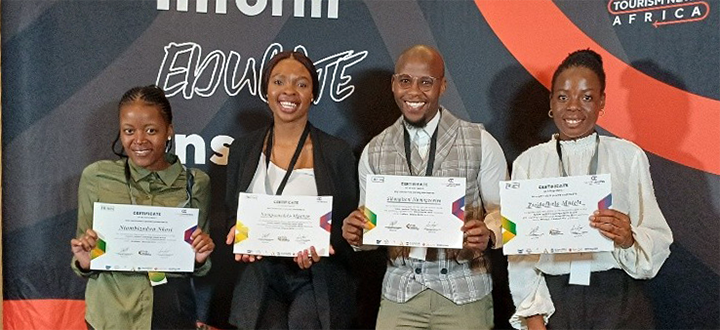News & Events
Unisa students’ groundbreaking empowerment project leads to Dubai invitation
Four tourism students from the Department of Applied Management in Unisa’s College of Economic and Management Sciences have been selected to represent the university at the Middle East and Africa (MEA) Future Leaders competition. This prestigious event is scheduled to take place in Dubai in January 2025 and will showcase the exceptional talent and innovative ideas of these future leaders in the tourism and hospitality sector.
In June 2023, Unisa, as one of the top 25 institutions of higher learning in Africa and the Middle East, received an invitation to nominate four outstanding tourism students for the MEA Future Leaders programme. Organised by the Game Changers Group, this initiative aims to unite industry leaders, students and universities to tackle future challenges in the hospitality and tourism industry, positioning the MEA region as a premier talent developer globally.

From left: Ntombizodwa Priscilla Nkosi, Nompumelelo Mgenge, Sibongiseni Nomngcoyiya, and Zwidofhela Getrude Mutele
At the recent MEA Future Leaders competition in Sandton, four Unisa students showcased their skills and creativity. These talented students are Nompumelelo Mgenge, a final-year Advanced Diploma in Tourism Management student, Ntombizodwa Priscilla Nkosi, a final-year Diploma in Tourism Management student, and Sibongiseni Nomngcoyiya and Zwidofhela Getrude Mutele, both final-year BCom Tourism Management students.
Dr Ntisi Manchidi, the Chair of the Department of Applied Management, along with Associate Professor Nellie Swart and Lecturer Nasreen Tisaker, provided support and mentorship to the students. Together, they created an innovative mobile application named TROVE. This groundbreaking platform aims to transform the tourism and hospitality sector by empowering women and youth in South Africa. TROVE features a new website and a brochure with a QR code for easy access, offering curated courses, internship opportunities, job listings and a business incubator for budding entrepreneurs.
Reflecting on the competition, Manchidi expressed immense pride in the students' achievements: “We were all ecstatic and overcome with joy. Words cannot express how happy and thankful we were. The students had tears in their eyes. We jumped in the air with joy, and all hugged each other as if we have known each other for years.”
Manchidi also highlighted the collaborative effort that led to their success: “It is a team effort. Nasreen Tisaker was instrumental in supporting the students during the early stages of the competition. We had weekly sessions to assist and guide the students in the development of the prototype and preparation for the final competition.”
Swart emphasised the inclusivity and community-building focus of TROVE: “TROVE prioritises inclusivity, skill development, flexibility, and community-building. It can play a significant role in empowering women and youth by providing them with equal access to opportunities and support in their career advancement efforts.”
The exceptional performance of the students has secured them a spot among the top three finalists, granting them the opportunity to present TROVE on an international platform in Dubai. This achievement marks a significant milestone for Unisa's tourism programmes, reaffirming the university's commitment to industry-relevant education and the success of its students both nationally and internationally.
As the students prepare for the event in Dubai, they will engage in weekly meetings and collaborate with peers from across Africa and the Middle East on a new project. The mentoring team, including Manchidi, will continue to support and guide them throughout this exciting journey, ensuring that they are well-prepared to excel at the MEA Future Leaders competition.
Manchidi emphasised that for aspiring students looking to participate in similar competitions, the advice from these successful Unisa representatives is clear: creativity, hard work and a thorough understanding of the competition brief are key to standing out and achieving success.
*By Tebogo Mahlaela, Communication and Marketing Specialist, College of Economic and Management Sciences
Publish date: 2024/06/18
